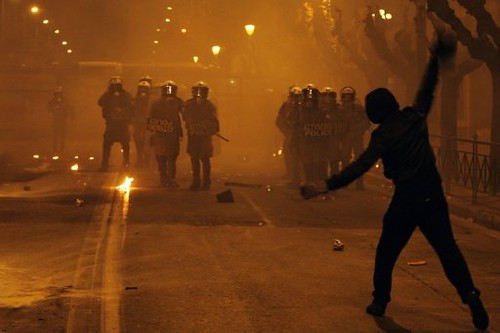
Greek youth clash with riot police in the aftermath of a new vote for further austerity measures imposed by the international financial institutions and the imperialist states. The government fell as a result of the crisis., a photo by Pan-African News Wire File Photos on Flickr.
New austerity budget approved in Greece after clashes
By John Hadoulis
(AFP)
ATHENS — Greek lawmakers early Wednesday approved a 2012 budget pledging tough fiscal goals demanded by EU partners in return for fresh loans after clashes broke out between protesters and police outside parliament.
A broad majority of the parties backing Lucas Papademos' caretaker administration secured the economic blueprint's passage by 258 votes to 41, the assembly said after the vote that concluded after midnight.
Papademos had earlier described the budget as a key first step in a process to reverse disastrous fiscal policies that have burdened each Greek with over 30,000 euros ($40,000) in state debt.
"Our actions will determine the country's economic future, not only for 2012 but for the entire decade," said Papademos, who took over last month with the task of ratifying a key eurozone debt deal and holding early elections.
The PM, a former European Central Bank deputy chief, also insisted that Greece's position in the European Union and the euro was "non-negotiable".
"Our place in Europe is non-negotiable. The Greek people will defend it in every way possible," Papademos said.
"Europe and our common currency remain, despite the crisis, one of the noblest achievements of recent history," he said.
The violence outside parliament broke out as thousands of pupils, students and leftist supporters staged separate demonstrations in memory of a schoolboy whose fatal shooting by police had sparked nationwide riots three years ago.
Protesters wearing gas masks and goggles threw firebombs and marble shards broken off from nearby buildings at police, who responded with tear gas and stun grenades to push them back, AFP reporters said.
Nearly 20 people including over a dozen officers were injured during an earlier bout of midday clashes and police said they had made 11 arrests.
Police held another 10 people in Thessaloniki after smaller-scale incidents.
The government had warned during the budget debate that the stakes could not be higher for the country amid a debt crisis which has upended the economy and threatened the eurozone despite the best efforts of the EU, IMF and Athens to stabilise its finances.
"A real earthquake is occurring in Europe at this moment," said conservative leader Antonis Samaras, one of the political partners backing the interim government set up last month to secure approval of a eurozone debt deal.
"We don't know where it will lead (so) we are in a hurry for Greece to capitalise as much as it can today," said Samaras, whose party holds a solid lead in the polls ahead of snap elections expected early next year.
Left-wing Syriza party leader Alexis Tsipras said the government was "denying reality" and "dogmatically" adhering to a failed austerity recipe that had already exacerbated a biting recession that has cost thousands of jobs.
"I've lost count how many times you've revised your forecasts," said Tsipras, pointing to previous estimates of growth in 2012 that were later dashed.
Greece's economy is expected to contract by 2.8 percent of output next year in a fifth straight year of recession.
A leading labour expert on Tuesday warned that years of hardship lay ahead.
"The Greek population will undergo ten years of enormous sacrifice," Savvas Robolis, director of the labour institute of main Greek union GSEE, told AFP.
"This austerity policy has led to an absolute impasse," he said.
The vote could not come at a more sensitive time for the eurozone after Standard & Poor's warned it could cut its credit ratings on the bloc, throwing another twist into the debt crisis.
Germany and France are leading the charge for major change in the way the bloc is run to ensure much tighter fiscal oversight from Brussels and reacted sharply to S&P on Tuesday, saying they would push ahead with the needed reforms.
An EU summit on Thursday and Friday is intended to agree deep institutional changes to stop the debt crisis which has pushed Greece, then Ireland and Portugal into EU-IMF debt bailouts and now threatens Italy and Spain.
The key issue for Greece is implementation after it missed deficit and debt targets laid down in a first EU and IMF rescue in May 2010 and was then forced to seek more help as the economy slumped.
A second accord agreed in late October requires Greece to adopt even tougher austerity measures in return for new funding of 100 billion euros and a controversial debt write-down deal with creditor banks worth 100 billion euros.
The accord also makes available 30 billion euros to help local banks cover the losses on their holdings of Greek government bonds caused by the 50-percent bond write-down.
The budget puts the public deficit at 5.4 percent of gross domestic product (GDP) in 2012, down from 9.0 percent this year, compared with the EU ceiling of 3.0 percent and the previous forecast for next year of 6.8 percent.
Finance Minister Evangelos Venizelos told parliament Greece will host a new round of talks with its international creditors next week on making its enormous debt sustainable.
"There will be a consultation, a discussion with the representatives of the private sector over the specific means of their participation in the reduction of public debt," Venizelos told parliament ahead of the budget vote.
No comments:
Post a Comment